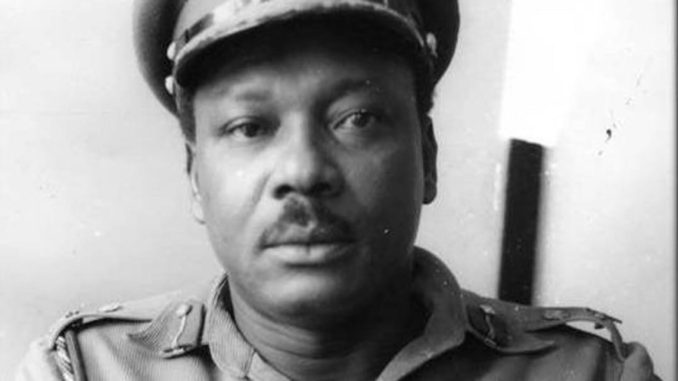
There is an issue of historical significance that members of the old and new set-ups in our society can learn from. Barely a week ago, the nation actually marked the 53rd anniversary of the military’s politics of power grab that led to the revenge-seeking counter-coup led by some young officers from the North on July 29, 1966.
Our young ones need to note that the counter-coup led to the assassination of General Johnson Aguiyi-Ironsi, the then Head of State and Supreme Commander of the Armed Forces. The Head of State had gone to Ibadan on July 28, 1966 to address a conference of traditional rulers of Western Nigeria and there was a successful counter-coup in the dawn of July 29. In a twist of fate, his chief host in Ibadan, Lt. Col. Adekunle Fajuyi, first Military Governor of Old Western Region who had opportunity to escape, gave his life too and the two of them (General Ironsi & Lt. Col. Fajuyi were killed in a forest along Iwo road, Ibadan. That gruesome episode was 53 years ago old last week.
The anniversary of this tragedy, which some significant colleagues noted last week, is remarkable at such a time like this.
It is still relevant to remind the young ones that though federalism as a bait actually emanated from one of our colonial rulers called Sir Hugh Clifford in 1922, solidified in 1946 by Sir Arthur Richards whose constitution laid the foundation for the prosperous regional governments that built the legacies we still see in the South West, South East and the North till date, the Decree. No 34 of 1966 by AguiyiIronsi killed federalism. And behold, for the past 53 years, death has held federalism captive in the grave.
The anniversary is a sad reminder of the gruesome murder of two young promising officers from the East & the West by their colleagues from the North. And history tells us that two factors could have triggered the reprisal killing in Ibadan that took the lives of the 42 year-old Ironsi and 40 year-old Fajuyi. The first factor fingered then was the bloody overthrow of the civilian regime of Prime Minister Tafawa Balewa’s government, which had taken place six months earlier. The first bloody coup then did not only take the life of Balewa from today’s Bauchi state, many other top functionaries especially of northern extraction, were also killed.
Again, apart from perception that the first coup (January 15, 1966) was led by a group of Igbo soldiers, which was curiously successful in the North and failed in the South, General Ironsi who later became Head of State hailed too from the East: he hailed from Umuahia-Ibeku, present-day Abia State. And this is the origin: On January 14, 1966, soldiers of mostly Igbo extraction led by major Chukwuma Kaduna Nzeogwu, an Igbo from Okpanam, near Asaba in today’s Delta State, literally eliminated the top echelon of politicians from the Northern and Western provinces. This, among other critical factors effectively led to the fall of the then republican government. It was said that though Ironsi was effectively marked for elimination too, he curiously took effective control of Lagos, the federal capital then. And again with the president then Nnamdi Azikiwe, an Igbo refusing to intervene to ensure the survival of civilian rule, Ironsi courageously forced the remnants of the Balewa’s government to resign. After that, he (Ironsi) made the Senate President then Nwafor Orizu, another Igbo, who was serving as acting President in Azikiwe’s absence to surrender power to him. And he (Orizu) did, thus ending the first republic.
That was how Ironsi inherited a deeply divided country worsened by ethnic and religious cleavages. The fact that none of the high-profile casualties of the 1966 first coup were of Igbo origin and most of the beneficiaries of the coup were Igbo fuelled the belief in the North that the whole coup story was an Igbo conspiracy. Though he tried to dispel this notion by doling political appointments to the aggrieved parties, his failure to punish the coup plotters and promulgation of Decree No. 34, which scrapped the country’s federalism structure and adoption of a unitary system confirmed the conspiracy theory in a way.
In any case, this anniversary is not just about Ironsi and how the nation has not significantly appreciated the sacrifice made by Fajuyi from Ado-Ekiti. Rather this Aguiyi-Fajuyi story is to nudge us about the devastating effects of military intervention in Nigerian politics 50 years ago. And it is sad that the consequences will remain with us longer than we expect. What is more, today, one of the state actors of the time – military rule, is Nigeria’s elected president and one of the hot potatoes he still does not like to be discussed is federalism or restructuring. The ancient grudge was 53 years old, last week. And lest we forget, 53 years on, there is still no love lost between the North and the South. Even in politics, the East is also still crying and one of the Oriental brothers who would like people to listen to Radio Biafra for whatever it is worth at such a time like this, is still being held in Abuja by a government headed by a retired General of northern extraction.
And here is the thing: When will Peace and Reconciliation Committee for the purpose of burying the ghosts of January 15 and July 29, 1966 be set up? When will the ‘militicians’ (military politicians) in the country accept responsibility for killing federalism with Decree No.34 50 years ago? When will the people power prevail against Unitary System (we call federal government) that is so entrenched in Abuja where they continue to tell us that Nigeria is not negotiable? When shall we lift the ban imposed on federalism principles by the Generals who have been ruling us and have been helping other lackeys that have been ruining us since 1966?
END

Be the first to comment